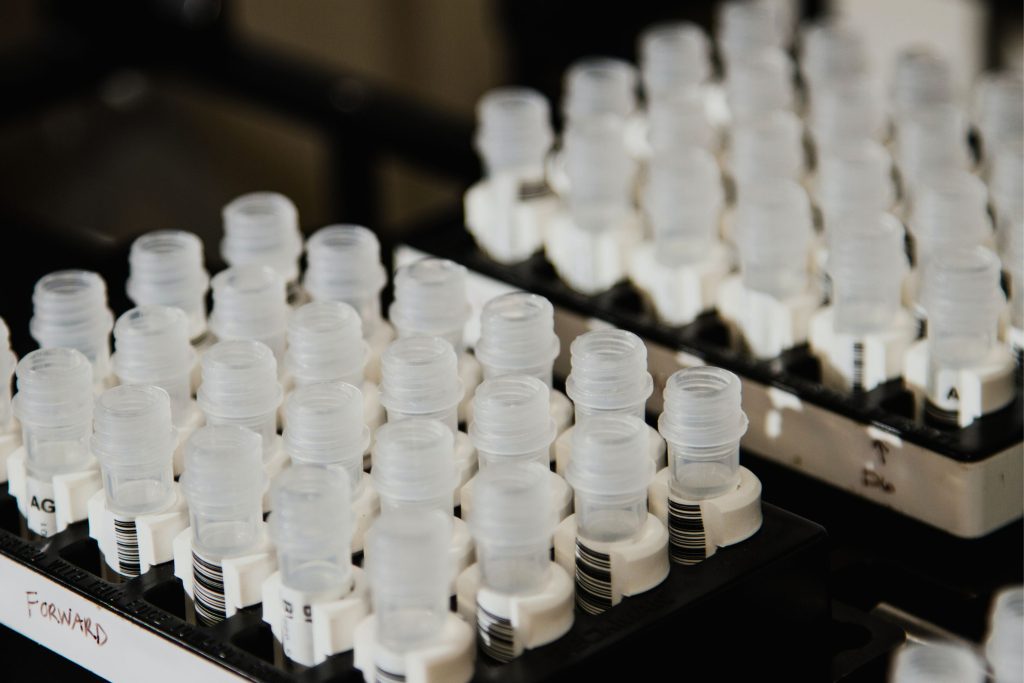Course
Pharmacogenomics and Mental Health
Course Highlights
- In this Pharmacogenomics and Mental Health course, we will learn about the foundations and importance of pharmacogenomics.
- You’ll also learn the significance of individualizing psychiatric care.
- You’ll leave this course with a broader understanding of the genetic impact on medication metabolism.
About
Contact Hours Awarded: 3
Course By:
Edith Fomuso
RN, MSN, CCM, DPM
Begin Now
Read Course | Complete Survey | Claim Credit
➀ Read and Learn
The following course content
Introduction
The rapidly evolving field of pharmacogenomics stands at the intersection of genetics and medicine, promising personalized medical treatments tailored to an individual’s genetic makeup. Within the context of psychiatric care, this science has the potential to revolutionize treatment protocols, ensuring that patients receive medications that are most likely to be effective based on their genetic profiles, thereby reducing adverse drug reactions and optimizing therapeutic outcomes (38).
With the rising prevalence of mental health disorders, healthcare providers must be equipped with the latest knowledge on how genetics play a role in medication responses (17). This course aims to provide nurses with a comprehensive overview of the contemporary trends in pharmacogenomics research, particularly how genetic variants can influence the effectiveness and potential side effects of psychiatric medications. As global mental health challenges escalate, intensified by events such as the COVID-19 pandemic, the ability to make genetically informed medication decisions has become more important for healthcare providers (20). After taking this course, nurses will be better prepared to navigate the challenges and possibilities pharmacogenomics presents.

Self Quiz
Ask yourself...
- What is the main focus of this course?
- Why might it be crucial for nurses, in particular, to be well-versed in the principles and research trends of pharmacogenomics, and how could this knowledge directly impact their patient care practices, especially in psychiatric care?
Definitions
In this section, we will define key terms and concepts essential to our exploration of pharmacogenomics, since familiarizing ourselves with these definitions will lay a strong foundation for deeper understanding as we delve into the course material.
Pharmacogenomics
According to (17), pharmacogenomics studies how an individual’s genetic makeup influences drug response. This field combines the principles of pharmacology (the science of drugs) and genomics (the study of genes and their functions) to optimize drug therapy in accordance with a patient’s specific genetic composition. By understanding genetic variances that affect drug metabolism and action, pharmacogenomics seeks to predict how individual patients will respond to a given drug in terms of efficacy and adverse effects, allowing for more personalized and effective treatment strategies. The ultimate goal of pharmacogenomics is to enhance therapeutic efficacy and minimize adverse drug reactions (38). This is coupled with ushering in an era of personalized medicine in which treatments are tailored to the unique genetic makeup of individual patients (38).
Pharmacogenetics
Pharmacogenetics is a subset of pharmacogenomics, focusing specifically on the role of inherited genetic differences in drug metabolism and responses (28). It examines how individual genetic variations, particularly single nucleotide polymorphisms (SNPs), can affect an individual’s response to medications, both in terms of therapeutic effects and potential adverse reactions. Pharmacogenetics aims to understand and predict how patients will respond to a medication based on their genetic makeup, allowing for more informed drug choices and dosages. While the term “pharmacogenomics” often encompasses a broader examination of the entire genome’s role in drug responses, pharmacogenetics focuses on specific genes known to affect drug outcomes (13).


Self Quiz
Ask yourself...
- How do pharmacogenomics and pharmacogenetics differ in scope and focus, even though they both revolve around the relationship between genetics and medication responses?
- How might pharmacogenetics, with its focus on inherited genetic differences, change the way doctors prescribe medications to patients?
- Considering that pharmacogenomics looks at the entire genome’s influence on drug responses, why might this broader approach be beneficial in tailoring medical treatments?
- How can understanding an individual’s genetic makeup through pharmacogenomics potentially reduce the risk of adverse drug reactions and enhance therapeutic outcomes?
History and Background of Pharmacogenomics
According to (6), although pharmacogenomics has a long history dating back to the middle of the 20th century, its foundations have been considerably strengthened and extended in recent years due to advances in technology. Initially, observations of varying medication responses in different people led to the hypothesis that hereditary variables could affect drug responses. With advanced technology, the Human Genome Project’s completion in 2003 was a turning point in the development of pharmacogenomics and opened the door for further research into how genes affect drug efficacy and metabolism (6).
This growing field is now steering medicine away from the traditional “one-size-fits-all” approach, towards a more personalized practice, and medical treatments are increasingly being tailored to the individual genetic makeup of patients. The personalized strategy promises to enhance patient care by improving treatment efficacy and reducing the likelihood of adverse reactions, marking a new era of precision in healthcare (38).

Self Quiz
Ask yourself...
- How might have the initial observations of different drug responses among individuals prompted the earliest inquiries into the relationship between genetics and drug metabolism?
- Considering the potential of pharmacogenomics, why might there still be challenges in fully integrating its principles into everyday clinical practice?
- How has the rise of pharmacogenomics shifted medicine from a “one-size-fits-all” approach, and what implications does this have for patient care and outcomes?
- How might the insights gained from the history of pharmacogenomics be used to predict or shape future directions and innovations in the field?
How Do Our Genes Impact How We Metabolize Medications?
According to (12), our genes play a pivotal role in determining how we metabolize medications, influencing both the efficacy of treatments and the potential for adverse reactions. At the molecular level, many drugs require specific enzymes to be metabolized and exert their therapeutic effects, and genetic variations (such as SNPs), can influence the activity of these enzymes, either enhancing or diminishing their function (12).
For instance, individuals with certain genetic profiles might produce enzymes that metabolize a drug too quickly, leading to suboptimal drug levels in the bloodstream and reduced therapeutic effects. Conversely, other genetic variations can result in slow medication metabolism, increasing the risk of accumulation and potential toxicities (12). Moreover, genes can also dictate the expression of drug targets and transporters, further modulating drug responses. As pharmacogenomics evolves, understanding these genetic underpinnings becomes crucial in tailoring medication regimens that align with a patient’s unique genetic makeup, optimizing therapeutic outcomes while minimizing potential risks (16).


Self Quiz
Ask yourself...
- How do genetic variations, such as single nucleotide polymorphisms (SNPs), potentially alter how specific drugs are processed within the body?
- Considering that genes can influence drug metabolism rates, how might these genetic factors play a role in determining the optimal dosage of a medication for individuals?
- In what ways might slow drug metabolism, potentially due to specific genetic factors, increase the risk of drug accumulation and subsequent adverse reactions?
- Beyond the direct metabolism of drugs, how might genes further influence medication responses by dictating the expression of drug targets and transporters?
Prevalence of Mental Health Disorders
Mental health disorders have steadily gained recognition as significant public health concerns worldwide. According to a report by the World Health Organization (WHO), mental illnesses account for a substantial fraction of the global burden of disease, with depression being a primary contributor to disability worldwide (34). Furthermore, conditions such as anxiety disorders, bipolar disorders, and schizophrenia significantly impact the lives of millions, influencing not only personal well-being but also socio-economic factors. A study by (32) emphasized that approximately one out of four individuals will experience a mental health problem at some point in their lives, underlining the widespread nature of these conditions.
Emerging data have further highlighted the demographic and geographic disparities in the prevalence of mental health disorders. For instance, females are often at a higher risk for certain conditions like depression and anxiety, compared to their male counterparts; and regions undergoing rapid urbanization, socio-economic changes, or conflict situations exhibit heightened vulnerability to mental health challenges (1). The intricate nature of these disorders highlights the critical need for a deeper understanding of their widespread prevalence, and the need for effective treatments (15).

Self Quiz
Ask yourself...
- Considering the World Health Organization’s data, why might mental health disorders be among the top causes of disability worldwide?
- What societal and individual impacts might this prevalence have?
- Considering that depression and anxiety are the most prevalent mental health disorders, how might societal changes, environmental factors, and individual life experiences contribute to this high prevalence?
- In light of the 2019 global data on anxiety and depressive disorders, how might such statistics inform future mental health initiatives, policies, and interventions?
Impact of COVID-19 on Mental Health
The onset of the COVID-19 pandemic was a global health crisis, that profoundly impacted both the physical health and mental well-being of individuals across the world. According to a study by (33), the uncertainty and unpredictability surrounding the virus, combined with lockdowns, social isolation, and economic downturns, exacerbated feelings of stress, anxiety, and depression in a significant portion of the population. The study documented an alarming surge in symptoms of depression and anxiety during the pandemic, especially among healthcare workers, individuals with pre-existing mental health disorders, and those directly affected by the virus, creating a substantial strain on mental health services.
Furthermore, the prolonged nature of the pandemic, coupled with fears of infection, grief over lost loved ones, and the overarching socio-economic challenges, may have compounded its psychological toll. Reports of increased substance use, domestic violence, and even suicidal ideation have been noted globally, drawing attention to the urgent need for robust mental health interventions (24). The long-term repercussions of the pandemic on mental health are yet to be fully understood. However, societies will require a concerted effort to address the profound mental health impacts of COVID-19 in the years to come.


Self Quiz
Ask yourself...
- Why might the collective psychological response of a population during an infectious outbreak be influential in shaping the disease’s trajectory and societal reactions?
- How did lockdown measures, designed to control the spread of the virus, inadvertently contribute to the rise in mental health challenges such as anxiety, depression, and domestic violence?
- Considering the heightened risks faced by healthcare professionals, especially nurses, why might they have been more susceptible to severe mental distress compared to the general population during the pandemic?
- How might the scarcity of critical resources, like personal protective equipment and ventilators, have exacerbated the psychological strains on healthcare workers?
Current Research
Recent studies have begun to unravel the complex interplay between genetic variations and responses to medications, offering promising insights into individualized care (30). Let’s see the details below regarding the relationship between non-psychiatric medications and gene traits or markers, and the impact of gene variants on psychiatric medication treatment.
Non-Psychiatric Medications Linked to Gene Traits or Markers
Pharmacogenomics is not limited to psychiatric medications. There are several non-psychiatric medications whose efficacy or side effects can be influenced by specific genetic markers or traits. Let’s see some of them below (2, 3, 4, 19, 39).
Abacavir (HIV treatment)
- Gene: HLA-B*5701
- Detail: Higher risk of experiencing hypersensitivity
Allopurinol (Gout treatment)
- Gene: HLA-B*5801
- Detail: Increased risk of developing severe skin reactions
Clopidogrel (Blood thinner)
- Gene: CYP2C19
- Detail: Higher risk of not metabolizing this drug effectively, reducing its efficacy
Codeine (Pain medication)
- Gene: CYP2D6
- Detail: Increased risk of metabolizing codeine rapidly, leading to a risk of overdose symptoms with standard doses
Irinotecan (Cancer treatment)
- Gene: UGT1A1
- Detail: Increased risk of toxicity
Metformin (Diabetes medication)
- Gene: SLC22A1, SLC47A1
- Detail: Risk of ineffective excretion, affecting its efficacy
Simvastatin (Cholesterol-lowering medication)
- Gene: SLCO1B1
- Detail: Increased risk of muscle pain or damage
Tacrolimus (Immunosuppressant)
- Gene: CYP3A5
- Detail: Risk of ineffective metabolism, increasing risk of overdosing
Thiopurines (Cancer and autoimmune disease treatment)
- Gene: TPMT, NUDT15
- Detail: Increased risk of toxic side effects
Warfarin (Blood thinner)
- Gene: VKORC1, CYP2C9
- Detail: Higher risk of bleeding
Gene Variants Impacting Psychiatric Medication Treatment
As mental health challenges vary widely among individuals, so do the efficacy and safety of treatments. Delving into specific gene variants that impact psychiatric medication treatments offers clinicians a lens to tailor therapies more effectively, ensuring maximum benefit while minimizing potential risks. The following section sheds light on ten prominent gene variants and their influence on various psychiatric medications, paving the way for a more personalized approach to mental health care. See the list of some gene variants below (5, 8, 18, 26).
Gene Variant: ABCB1
- Medication: Antipsychotics and antidepressants
- Detail: Affects drug transport across the blood-brain barrier. Variants can influence drug levels in the brain.
Gene Variant: COMT
- Medication: Antipsychotics
- Detail: Involved in dopamine metabolism. Variations can influence the effectiveness of treatments.
Gene Variant: CYP1A2
- Medication: Antipsychotics like clozapine
- Detail: Can influence drug metabolism rate, impacting dosing needs and risk of side effects.
Gene Variant: CYP2C19
- Medication: Antidepressants like citalopram and escitalopram
- Detail: Impacts how these drugs are metabolized. Certain individuals might experience reduced drug efficacy or heightened side effects.
Gene Variant: CYP2D6
- Medication: Antidepressants like fluoxetine and paroxetine
- Detail: Alters drug metabolism. Some individuals may require dosage adjustments to prevent side effects or ensure efficacy.
Gene Variant: CYP3A4
- Medication: Antipsychotics like aripiprazole and quetiapine
- Detail: Influences drug metabolism rate. Some individuals may need dosage adjustments.
Gene Variant: DRD2
- Medication: Antipsychotics like risperidone
- Detail: Variations can influence the drug’s effectiveness in reducing psychotic symptoms.
Gene Variant: FKBP5
- Medication: Antidepressants
- Detail: Impacts drug response. Variations can influence the time it takes to see therapeutic benefits.
Gene Variant: HLA-B*1502
- Medication: Carbamazepine, an anticonvulsant used in bipolar disorder
- Detail: Those with this variant are at risk of severe skin reactions when taking the drug.
Gene Variant: SLC6A4
- Medication: Selective serotonin reuptake inhibitors (SSRIs) like fluoxetine
- Detail: Influences serotonin transport. Variations can affect drug response and side effects.


Self Quiz
Ask yourself...
- How might specific gene variants influence an individual’s response to a particular psychiatric medication?
- How can understanding gene variants improve patient adherence to medication regimens?
- How do gene variants play a role in the manifestation and severity of side effects?
- How might knowledge of gene variants impact the current trial-and-error approach in prescribing psychiatric medications?
Upcoming Research
Several researchers are aiming to find the best treatments for people based on their unique genes. The following is an overview of the upcoming research trends.
Individualized Treatment Plans
With increasing insights into how genes influence drug responses, there’s a surge in studies focusing on developing individualized treatment strategies for mental health disorders, ensuring maximum efficacy and minimal side effects (37).
Polygenic Risk Scores
Polygenic risk scores (PRSs), which aggregate the effects of many genetic variants associated with disease risk, are being evaluated for their potential to predict individual responses to psychiatric medications. This area holds promise in refining the drug selection process (22).
Comorbidity and Multi-Drug Regimens
Given that many patients with mental health disorders are prescribed multiple drugs, researchers are probing into the genetic influences on multi-drug interactions and their resultant therapeutic outcomes (31).
Innovative Technologies
Integrating artificial intelligence and machine learning with pharmacogenomics is on the horizon. Such collaborations aim to process vast genomic data to derive actionable insights, paving the way for more efficient, precise therapeutic interventions (29).
Environmental Interactions
Upcoming studies are not only focused on genetic variations but also on how these variations interact with environmental factors to influence drug responses. This multi-faceted approach promises a holistic view of treatment modalities (14).
Expansion of Targeted Gene Panels
As our understanding deepens, researchers are continuously updating and expanding the panels of genes tested in relation to specific psychiatric medications, ensuring more comprehensive insights (10).

Self Quiz
Ask yourself...
- What are the potential implications of Polygenic Risk Scores (PRS) in predicting and guiding psychiatric medication treatments?
- In what ways can the study of multi-drug interactions and genetic influences help healthcare providers tackle comorbid mental health disorders?
- How do environmental factors interact with genetic variations, and why might this interaction be crucial for understanding medication responses in mental health?
- As we continue to update and expand the panels of genes tested, what challenges might arise in ensuring that psychiatric medications remain effective and safe for patients?
Future of Pharmacogenomics
The future of pharmacogenomics is marked by its promise to bring forth a more personalized, safer, and effective approach to medical treatments. As technological advancements continue to soar, the costs of genome sequencing are projected to decline, enabling more individuals to have their genomes sequenced and analyzed. This is anticipated to facilitate the broader implementation of personalized medicine across various healthcare settings (25).
In tandem with technological growth, integrating pharmacogenomics into electronic health records (EHRs) is expected to become commonplace. This will allow healthcare providers to access genetic data seamlessly, thus making informed decisions on drug prescriptions based on an individual’s genetic makeup (11).
Furthermore, there’s an increasing recognition of the role pharmacogenomics can play in addressing health disparities. Research is intensifying on understanding genetic variations across different populations, aiming to ensure that all ethnicities benefit equally from the advances in personalized medicine (7).
Educational initiatives will also be crucial. As pharmacogenomics becomes more integrated into clinical practice, there’s an imperative need to educate both the current and the next generation of healthcare professionals about its principles and applications, ensuring that they are equipped to harness its potential to the fullest (9).


Self Quiz
Ask yourself...
- How might the decreasing costs of genome sequencing affect the accessibility and popularity of personalized medicine in various healthcare settings?
- As pharmacogenomics becomes integrated into electronic health records, what ethical considerations arise concerning the storage, access, and sharing of genetic data?
- In what ways could pharmacogenomics contribute to addressing and potentially reducing health disparities among different ethnic and socio-economic groups?
- As we move towards more personalized medicine through pharmacogenomics, what implications might this have for the pharmaceutical industry regarding drug development, marketing, and regulatory approvals?
Conclusion
For healthcare professionals, embracing the knowledge from this course means stepping into a new era of patient care, where treatment decisions can be precisely tailored to align with a patient’s unique genetic blueprint. This promises not only optimized therapeutic outcomes but also minimized adverse reactions, ushering in a more efficient and patient-centered approach to mental health care. By integrating pharmacogenomic principles, clinicians are better positioned to offer holistic and individualized care, making a significant difference in patient experiences and outcomes in the dynamic world of mental health. Armed with this knowledge, healthcare professionals are set to transform and elevate the standards of psychiatric care in the years to come.

Self Quiz
Ask yourself...
- How might an understanding of pharmacogenomics alter the way healthcare professionals approach the treatment planning for patients with mental health disorders?
- Suppose mental health conditions such as depression can reduce life expectancy, what might this suggest about the holistic impact of these disorders on a person’s overall health and well-being?
- How might cultural, social, or even genetic factors play a role in the differing prevalence of mental health disorders across various ethnicities?
- Given the immediate mental health challenges observed during the pandemic, what potential long-term psychological impacts might individuals and societies face in the post-pandemic era?
- In what ways did the economic repercussions of the pandemic, such as rising unemployment rates, directly or indirectly affect mental well-being?
- In what ways could the integration of pharmacogenomic principles into mental health care enhance patient outcomes and healthcare experiences?
- How do you envision the evolution of personalized medicine with the continued advancements in pharmacogenomics and pharmacogenetics?
- Given our current understanding of how genes impact drug metabolism, how can healthcare providers leverage this knowledge to enhance patient care and pave the way for more personalized treatment regimens?
- Considering the genetic diversity in populations, how might pharmacogenomics help address disparities in mental health treatment outcomes across different ethnic groups?
- How can healthcare professionals keep updated with the rapidly expanding knowledge of gene variants and their association with psychiatric drug efficacy and safety?
- How might the individualization of treatment plans in pharmacogenomics lead to improved patient outcomes in mental health?
- How might integrating artificial intelligence and machine learning in pharmacogenomics reshape the future of mental health treatments?
- How will integrating pharmacogenomics into clinical practice reshape the responsibilities and required knowledge base of healthcare professionals?
- Considering the rapid advances in technology and data analytics, how might artificial intelligence and machine learning further enhance the applications of pharmacogenomics in the coming decades?
References + Disclaimer
- Albert, P. R. (2019). Why is depression more prevalent in women? Journal of Psychiatry & Neuroscience, 40(4), 219-221.
- Bousman, C. A., Arandjelovic, K., Mancuso, S. G., Eyre, H. A., & Dunlop, B. W. (2019). Pharmacogenetic tests and depressive symptom remission: a meta-analysis of randomized controlled trials. Pharmacogenomics, 20(1), 37-47.
- Cavallari, L. H., & Limdi, N. A. (2018). Warfarin pharmacogenomics. Current Opinion in Hematology, 25(5), 398-406.
- Chen, P., Lin, J. J., Lu, C. S., Ong, C. T., Hsieh, P. F., Yang, C. C., … & Chen, Y. T. (2011). Carbamazepine-induced toxic effects and HLA-B*1502 screening in Taiwan. New England Journal of Medicine, 364(12), 1126-1133.
- Chung, W. H., Chang, W. C., Lee, Y. S., Wu, Y. Y., Yang, C. H., Ho, H. C., … & Su, S. C. (2014). Genetic variants associated with phenytoin-related severe cutaneous adverse reactions. Jama, 312(5), 525-534.Top of Form
- Collins, F. S., & Varmus, H. (2015). A new initiative on precision medicine. New England Journal of Medicine, 372(9), 793-795.
- Dunnenberger, H. M., et al. (2017). Preemptive clinical pharmacogenetics implementation: current programs in five US medical centers. Annual Review of Pharmacology and Toxicology, 57, 89-106.
- Fabbri, C., & Serretti, A. (2015). Pharmacogenetics of major depressive disorder: top genes and pathways toward clinical applications. Current Psychiatry Reports, 17(7), 50.
- Haga, S. B., Burke, W., Ginsburg, G. S., Mills, R., & Agans, R. (2016). Primary care physicians’ knowledge of and experience with pharmacogenetic testing. Clinical Genetics, 90(3), 228-234.
- Hahn, M. K., & Blakely, R. D. (2020). The functional impact of SLC6 transporter genetic variation. Annual Review of Pharmacology and Toxicology, 60, 585-608.
- Hoffman, J. M., et al. (2016). PG4KDS: a model for the clinical implementation of pre-emptive pharmacogenetics. American Journal of Medical Genetics Part C: Seminars in Medical Genetics, 172(4), 290-297.
- Ingelman-Sundberg, M., & Rodriguez-Antona, C. (2020). Pharmacogenomics of drug-metabolizing enzymes: a recent update on clinical implications and endogenous effects. Pharmacology & Therapeutics, 207, 107476.
- Ji, Y., Skierka, J. M., Blommel, J. H., Moore, B. E., VanCuyk, D. L., & Black, J. L. (2016). Preemptive pharmacogenomic testing for precision medicine: a comprehensive analysis of five actionable pharmacogenomic genes using next-generation DNA sequencing and a customized CYP2D6 genotyping cascade. The Journal of Molecular Diagnostics, 18(3), 438-445.
- Kalia, V., & Langley, G. R. (2021). Environment-genome interplay in pharmacogenomics. Nature Reviews Genetics, 22, 56-68.
- Kessler, R. C., Aguilar-Gaxiola, S., Alonso, J., Chatterji, S., Lee, S., Ustün, T. B., … & Wang, P. S. (2020). The global burden of mental disorders: an update from the WHO World Mental Health (WMH) surveys. Epidemiology and Psychiatric Sciences, 18(1), 23-33.
- Klein, M. E., Parvez, M. M., & Shin, J. G. (2019). Clinical implementation of pharmacogenomics for personalized precision medicine: barriers and solutions. Journal of Pharmaceutical Sciences, 108(9), 2946-2954.
- Kumar, R., & Ruderfer, D. M. (2020). Pharmacogenomics in psychiatry: the relevance of receptor and transporter polymorphisms. British Journal of Clinical Pharmacology, 86(4), 606-617.
- Lencz, T., & Malhotra, A. K. (2019). Pharmacogenetics of antipsychotic-induced side effects. Dialogues in Clinical Neuroscience, 21(2), 135-142.
- Mega, J. L., Walker, J. R., Ruff, C. T., Vandell, A. G., Nordio, F., Deenadayalu, N., … & Close, S. L. (2015). Genetics and the clinical response to warfarin and edoxaban: findings from the randomised, double-blind ENGAGE AF-TIMI 48 trial. The Lancet, 385(9984), 2280-2287.
- Muller, D., & Kennedy, J. L. (2021). Genetics and the future of personalized psychiatry. Genes, Brain and Behavior, 20(4), e12702.
- Müller, D. J., Kekin, I., Kao, A. C., & Brandl, E. J. (2013). Towards the implementation of CYP2D6 and CYP2C19 genotypes in clinical practice: update and report from a pharmacogenetic service clinic. International Review of Psychiatry, 25(5), 554-571.
- Müller, N., & Myint, A.-M. (2020). The role of polygenic risk scores in predicting drug responses in psychiatric disorders. Molecular Psychiatry, 25(8), 1702-1710.
- Nielsen, J., Rasmussen, H. B., Hellfritzsch, M., Thirstrup, K., Damkier, P., & Brosen, K. (2015). The impact of CYP2D6 polymorphisms on the pharmacokinetics of codeine and its metabolites in Mongolian and Caucasian subjects. Pharmacogenetics and Genomics, 25(10), 491-500.
- Pfefferbaum, B., & North, C. S. (2020). Mental health and the Covid-19 pandemic. The New England Journal of Medicine, 383(6), 510-512.
- Phillips, K. A. (2017). The economic value of personalized medicine tests: what we know and what we need to know. Genetics in Medicine, 19(3), 251-257.
- Porcelli, S., Drago, A., & Fabbri, C. (2011). Pharmacogenetics of antidepressant response. Journal of Psychiatry & Neuroscience, 36(2), 87-113.
- Ramsey, L. B., Bruun, G. H., Yang, W., Treviño, L. R., Vattathil, S., Scheet, P., … & Gotschall, E. (2012). Rare versus common variants in pharmacogenetics: SLCO1B1 variation and methotrexate disposition. Genome Research, 22(1), 1-8.
- Scott, S. A., Sangkuhl, K., Stein, C. M., Hulot, J. S., Mega, J. L., Roden, D. M., … & Klein, T. E. (2013). Clinical Pharmacogenetics Implementation Consortium guidelines for CYP2C19 genotype and clopidogrel therapy. Clinical Pharmacology & Therapeutics, 94(3), 317-323.
- Sharma, T., & Fernandes, B. (2021). Integration of artificial intelligence in pharmacogenomics-focused research: Realizing its potential. Journal of Neural Transmission, 128, 1523-1534.
- Smith, J. T., & Johnson, M. L. (2021). Personalized medicine in psychiatry: The role of pharmacogenomics. Journal of Clinical Psychopharmacology and Neuroscience, 19(2), 145-156.
- Stahl, S. M. (2020). The future of polypharmacy and drug development in psychiatry: A personalized approach. Pharmacology Research & Perspectives, 8(4), e00631.
- Thornicroft, G., Chatterji, S., Evans-Lacko, S., Gruber, M., Sampson, N., Aguilar-Gaxiola, S., … & Gureje, O. (2017). Undertreatment of people with major depressive disorder in 21 countries. The British Journal of Psychiatry, 210(2), 119-124.
- Vindegaard, N., & Benros, M. E. (2020). COVID-19 pandemic and mental health consequences: Systematic review of the current evidence. Brain, Behavior, and Immunity, 89, 531-542.
- World Health Organization. (2018). Depression and other common mental disorders: Global health estimates. World Health Organization.
- Zhang, J. P., Lencz, T., & Malhotra, A. K. (2010). D2 receptor genetic variation and clinical response to antipsychotic drug treatment: a meta-analysis. American Journal of Psychiatry, 167(7), 763-772.
- Zhang, J. P., Malhotra, A. K., & Lencz, T. (2020). Pharmacogenetics and antipsychotics: therapeutic efficacy and side effects prediction. Expert Opinion on Drug Metabolism & Toxicology, 16(1), 83-92.
- Zhang, L., & Ruan, Y. (2021). Advancements in pharmacogenomics and mental health treatment individualization. Journal of Pharmacogenomics & Personalized Medicine, 14, 123-135.
- Zhou, Y. (2019). The promise and challenges of pharmacogenomics in psychiatry. Molecular Psychiatry, 24(10), 1347-1356.
- Zhu, Y., Wang, G., Gurwitz, D., & Roden, D. M. (2018). Pharmacogenomics of cardiovascular drugs and adverse effects in the elderly. Pharmacogenomics, 19(8), 711-723.
Disclaimer:
Use of Course Content. The courses provided by NCC are based on industry knowledge and input from professional nurses, experts, practitioners, and other individuals and institutions. The information presented in this course is intended solely for the use of healthcare professionals taking this course, for credit, from NCC. The information is designed to assist healthcare professionals, including nurses, in addressing issues associated with healthcare. The information provided in this course is general in nature and is not designed to address any specific situation. This publication in no way absolves facilities of their responsibility for the appropriate orientation of healthcare professionals. Hospitals or other organizations using this publication as a part of their own orientation processes should review the contents of this publication to ensure accuracy and compliance before using this publication. Knowledge, procedures or insight gained from the Student in the course of taking classes provided by NCC may be used at the Student’s discretion during their course of work or otherwise in a professional capacity. The Student understands and agrees that NCC shall not be held liable for any acts, errors, advice or omissions provided by the Student based on knowledge or advice acquired by NCC. The Student is solely responsible for his/her own actions, even if information and/or education was acquired from a NCC course pertaining to that action or actions. By clicking “complete” you are agreeing to these terms of use.
➁ Complete Survey
Give us your thoughts and feedback
➂ Click Complete
To receive your certificate
